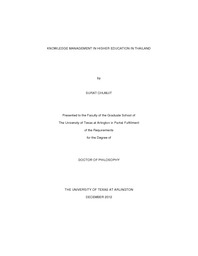
ATTENTION: The works hosted here are being migrated to a new repository that will consolidate resources, improve discoverability, and better show UTA's research impact on the global community. We will update authors as the migration progresses. Please see MavMatrix for more information.
Show simple item record
| dc.contributor.author | Chumjit, Surat | en_US |
| dc.date.accessioned | 2013-03-20T19:12:21Z | |
| dc.date.available | 2013-03-20T19:12:21Z | |
| dc.date.issued | 2013-03-20 | |
| dc.date.submitted | January 2012 | en_US |
| dc.identifier.other | DISS-12011 | en_US |
| dc.identifier.uri | http://hdl.handle.net/10106/11597 | |
| dc.description.abstract | This study examines how knowledge management (KM) is applied to higher education in Thailand, and it will also examine whether higher education in Thailand is ready to combine KM with their educational missions in terms of teaching, research, administration, and strategic planning. Knowledge creation and social networking frameworks are used to help understand approaches that higher education institutions in Thailand have used with KM in their day to day operations. The qualitative method is used to explore and understand KM applications within four autonomous universities in Thailand. In-depth interviews were used in this study and the narrative method is used to analyze data.The results of this research were developed from a study of four autonomous universities. The results of the research study findings include the following 1) the four universities have tried to create new knowledge in both tacit knowledge and explicit knowledge. New methods for improving teaching, research, administration, and strategic planning have been created; 2) it is difficult to answer the question of whether the four universities are ready to combine KM with their missions. KM has been successfully applied within various sections and departments. This study also found that there are nine factors that lead to successfully applying KM with Thai universities. These ingredients are comprised of the following: understanding KM meanings; the importance of leadership in KM; the community of practices; tools; incentives and recognition; training programs; learning from other's experience; volunteers; and storytelling; In addition, the four universities also have difficulty when applying KM. The factors that delay KM involve issues of workload and time constraints. Some of the university staff members do not want to share their knowledge if they do not have a problem with their work. Information and knowledge will be installed in staff offices and it is difficult for other university staff members to access it. Information and knowledge will be shared among close friends. Some of the university staff members do not want to take notes and this will impact KM utilization. | en_US |
| dc.description.sponsorship | Hissong, Rod | en_US |
| dc.language.iso | en | en_US |
| dc.publisher | Public Administration | en_US |
| dc.title | Knowledge Management In Higher Education In Thailand | en_US |
| dc.type | Ph.D. | en_US |
| dc.contributor.committeeChair | Hissong, Rod | en_US |
| dc.degree.department | Public Administration | en_US |
| dc.degree.discipline | Public Administration | en_US |
| dc.degree.grantor | University of Texas at Arlington | en_US |
| dc.degree.level | doctoral | en_US |
| dc.degree.name | Ph.D. | en_US |
Files in this item
- Name:
- Chumjit_uta_2502D_12011.pdf
- Size:
- 691.0Kb
- Format:
- PDF
This item appears in the following Collection(s)
Show simple item record


